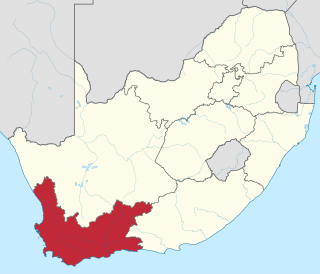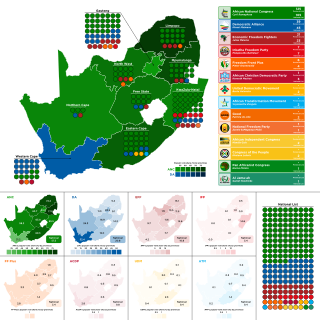
The New National Party (NNP) was a South African political party formed in 1997 as the successor to the National Party, which ruled the country from 1948 to 1994. The name change was an attempt to distance itself from its apartheid past, and reinvent itself as a moderate, mainstream conservative and non-racist federal party. The attempt was largely unsuccessful, and in 2005 the New National Party voted to disband itself.

The Western Cape is a province of South Africa, situated on the south-western coast of the country. It is the fourth largest of the nine provinces with an area of 129,449 square kilometres (49,981 sq mi), and the third most populous, with an estimated 7 million inhabitants in 2020. About two-thirds of these inhabitants live in the metropolitan area of Cape Town, which is also the provincial capital. The Western Cape was created in 1994 from part of the former Cape Province. The two largest cities are Cape Town and George.

The Democratic Alliance is a South African political party and the official opposition to the ruling African National Congress (ANC). The party is broadly centrist, and has been attributed both centre-left and centre-right policies. It is a member of Liberal International and the Africa Liberal Network. The DA traces its roots to the founding of the anti-apartheid Progressive Party in 1959, with many mergers and name changes between that time and the present. The DA ideologically shows a variety of liberal tendencies, including social liberalism, classical liberalism, and conservative liberalism.

The Freedom Front Plus is a right-wing political party in South Africa that was formed in 1994. It is led by Pieter Groenewald.

General elections were held in South Africa on Wednesday, 14 April 2004. The African National Congress (ANC) of President Thabo Mbeki, which came to power after the end of the apartheid system in 1994, was re-elected with an increased majority.

The City of Cape Town is a metropolitan municipality that forms the local government of Cape Town and surrounding areas. As of the 2016 community survey, it had a population of 4,005,016.

Otta Helene Maree, known as Helen Zille, is a South African politician. She has served as the Chairperson of the Federal Council of the Democratic Alliance since 20 October 2019. From 2009 until 2019, she was the Premier of the Western Cape province for two five-year terms, and a member of the Western Cape Provincial Parliament. She served as Federal Leader of the Democratic Alliance from 2007 to 2015 and as Mayor of Cape Town from 2006 to 2009.

General elections were held in South Africa on 22 April 2009 to elect members of the National Assembly and provincial legislatures. These were the fourth general elections held since the end of the apartheid era.
Although the Democratic Alliance of South Africa in its present form is fairly new, its roots can be traced far back in South African political history, through a complex sequence of splits and mergers.
Grant Haskin is currently serving as Member of the Cape Town City Council and Leader of the African Christian Democratic Party in the Cape Town City Council. He previously served as Executive Deputy Mayor of Cape Town, Acting Mayor of Cape Town, Mayoral Committee Member for Community Services and Sports and Amenities. He served in the Western Cape Provincial Parliament for two periods. While a Member of the Provincial Parliament, he served as Chairman of the Standing Committee on Public Accounts (SCOPA) and Special Delegate to the National Council of the Provinces.

The Cape Independence Party (CAPEXIT), previously called the Cape Party, is a political party in South Africa which seeks to use all constitutional and legal means to bring about Cape independence, which includes the entire Western Cape, Northern Cape, six municipalities in the Eastern Cape, and one municipality in the Free State. The area includes all municipalities in those provinces with an Afrikaans-speaking majority. In 2009, it was claimed to have had a membership of approximately 1,000 people across South Africa, but official membership figures are not made public. The party currently holds two seats on the Cape Town City Council.

Ian Douglas Neilson is a South African civil engineer and politician who served as the Deputy Mayor of Cape Town from May 2009 to October 2021. He previously served as the Mayoral Committee Member for Finance from 2006 until 2016 and Executive Councillor for Safety and Health from 2000 until 2002.

General elections were held in South Africa on 7 May 2014, to elect a new National Assembly and new provincial legislatures in each province. It was the fifth election held in South Africa under conditions of universal adult suffrage since the end of the apartheid era in 1994, and also the first held since the death of Nelson Mandela. It was also the first time that South African expatriates were allowed to vote in a South African national election.

General elections were held in South Africa on 8 May 2019 to elect a new President, National Assembly and provincial legislatures in each province. These were the sixth elections held since the end of apartheid in 1994 and determined who would become the next President of South Africa.
The council of the City of Cape Town in the Western Cape, South Africa is elected every five years by a system of mixed-member proportional representation. Half of the councillors are elected by first-past-the-post voting from individual wards, while the other half are appointed from party lists so that the total number of party representatives is proportional to the number of votes received. By-elections are held to replace the councillors elected by wards if a vacancy occurs.

The 2021 South African municipal elections were held on 1 November 2021, to elect councils for all district, metropolitan and local municipalities in each of the country's nine provinces. It is the sixth municipal election held in South Africa since the end of apartheid in 1994, held every five years. The previous municipal elections were held in 2016. On 21 April 2021, President Cyril Ramaphosa announced that the elections will be held on Wednesday, 27 October 2021. It had been recommend by Dikgang Moseneke to delay the municipal elections until 2022. The Electoral Commission of South Africa (IEC) requested the Constitutional Court to support the date postponement. The Economic Freedom Fighters (EFF) supported the date postponement while the Democratic Alliance (DA) was against the postponement of the date. The Constitutional Court dismissed the application to postpone the date until 2022, ruling that they had to take place between 27 October and 1 November. On 9 September 2021, the Minister of Cooperative Governance and Traditional Affairs, Nkosazana Dlamini-Zuma announced that the elections would be held on 1 November.
General elections will be held in South Africa on 29 May 2024 to elect a new National Assembly as well as the provincial legislature in each of the nine provinces. This will be the seventh general election held under the conditions of universal adult suffrage since the end of the apartheid era in 1994. The new National Council of Provinces (NCOP) will be elected at the first sitting of each provincial legislature. Since the inaugural post-apartheid election in 1994, the African National Congress (ANC) has continuously achieved a majority in both chambers of the South African Parliament: the National Assembly and the National Council of Provinces.

The 2009 Western Cape provincial election was held on 22 April 2009 alongside the 2009 general elections to elect the 42 members of the 4th Western Cape Provincial Parliament. It was the third time in provincial history that saw a change of government.
Johan Pieter Gelderblom is a South African retired politician. A former member of the New National Party, he served as a party representative in the Western Cape Provincial Parliament. From 2001 to 2004, he served as the Western Cape Minister of Agriculture and Tourism, and Environmental Affairs. After the 2004 election, he became the chairperson of the provincial parliament's Standing Committee on Public Accounts (SCOPA). He joined the African National Congress in 2005. Gelderblom served as an ANC MP from 2009 to 2014.
Freddie Adams is a South African retired politician. A former member of the New National Party, he joined the National Council of Provinces in 2003. He joined the African National Congress in 2005. After the 2014 election, Adams became a member of the National Assembly. Adams left Parliament at the 2019 election.















